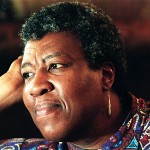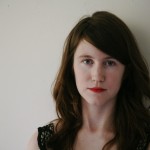 When an interviewer asked Hugo- and Macarthur-winning novelist Octavia Butler what she thought of her books being classed as science fiction, she said, “Really, it doesn’t matter. A good story is a good story.” Here is (some of) the story of Butler’s life.
When an interviewer asked Hugo- and Macarthur-winning novelist Octavia Butler what she thought of her books being classed as science fiction, she said, “Really, it doesn’t matter. A good story is a good story.” Here is (some of) the story of Butler’s life.
Butler grew up in Pasadena, raised by a single mother who’d had to leave school after the third grade. Of her own early years, Butler has written,
At school I was always taller than the rest of my class, and because I was an only child I was comfortable with adults, but shy and awkward with other kids. I was quiet, bookish, and in spite of my size, hopeless at sports. In short, I was different. And even in the earliest grades, I got pounded for it. I learned that five- and-six-year-old kids have already figured out how to be intolerant.
But she also discovered writing at the age of 10 – she chose science fiction, she says, because “because it was so wide open. I was able to do anything and there were no walls to hem you in and there was no human condition that you were stopped from examining.” Her books – the first, Patternmaster, was published in 1976, and the last, Fledgling, came out in 2005 – did more than examine. They also reflected the deep inequalities plaguing America – and humanity as a whole — and sounded a warning for the future. Butler said her novel Parable of the Sower “calls people’s attention to the fact that so much needs to be done and obviously [there] are people who are running this country who don’t care.”
Parable of the Sower is at times a heartbreaking book, and Butler said in a 2006 interview that she felt “unhopeful” for the future. At the same time, her books can be a great source of hope. One of the great joys of science fiction is its unabashed embrace of the heroic, and Sower offers a complex, convincing, and incredibly powerful heroine in Lauren Olamina. Faced with the destruction of everyone and everything she knows, and forced to strike out into the lawless landscape of 2027 California, Lauren insists, “I mean to survive.” And she doesn’t just survive – she founds a religion, writes its holy book, and becomes the center of its very first community.
Readers young and old don’t just pick up science fiction – or any other genre for that matter – to escape our daily lives. We also read when we’re looking for inspiration, and Lauren, who becomes a leader through strength and ingenuity and a wisdom beyond her eighteen years, inspires. Like Butler, Lauren is a black woman, and her gender and race are significant. Science fiction has grown somewhat more diverse lately, but for a long time it offered a vision of the future in which only white people appeared to have survived. And only white men seemed capable of conquering alien armies or saving their civilizations from ruin. Butler’s heroines (not just Lauren, but also Dana of Kindred, and many others too) may well have paved the way for the likes of Katniss Everdeen of The Hunger Games – and more than that, they offer a depiction, still all too rare, of black women at the center of their stories. And not just any stories, either, but stories of civilizations transformed, new species created, new ways of living explored. Too often, women – and especially women of color – have been the assistants, the girlfriends, the nannies, the peripheral figures in science fiction and in popular culture as a whole. In Butler’s work, they are the heroes.
And for anyone who wants to write, Butler too is a hero. Asked about her beginnings as a writer, she said, “writing was what I wanted to do, it was always what I wanted to do. I had novels to write so I wrote them. “ It sounds simple — but her perseverance in and mastery of a field dominated by white men can lead the way for women, for women of color, and for anyone who’s ever felt, as Butler did in school, like an outsider. She had novels to write, and so she wrote them, even in the face of great obstacles. Hers is a good story for all of us to know.
 About Anna:
About Anna:
Anna North is a staff writer for Jezebel, and a fiction writer. In addition to her daily posts on Jezebel, she has published fiction in the Atlantic Monthly, and her first novel, America Pacifica, will be published by Reagan Arthur Books/Little, Brown in May 2011.
Guest
Latest posts by Guest (Posts)
- Kate Swift Obit: The Language of Power and the Power of Language - May 17, 2011
- Ma McDonough Was No Ordinary Woman - March 30, 2011
- Indira Gandhi: World Leader or Witch? - March 29, 2011





 "Female Writers Kicking Up Literary Dust"
"Female Writers Kicking Up Literary Dust"
Pingback: Women’s History Roundup: The Lesser Knowns Edition | 9 Ways